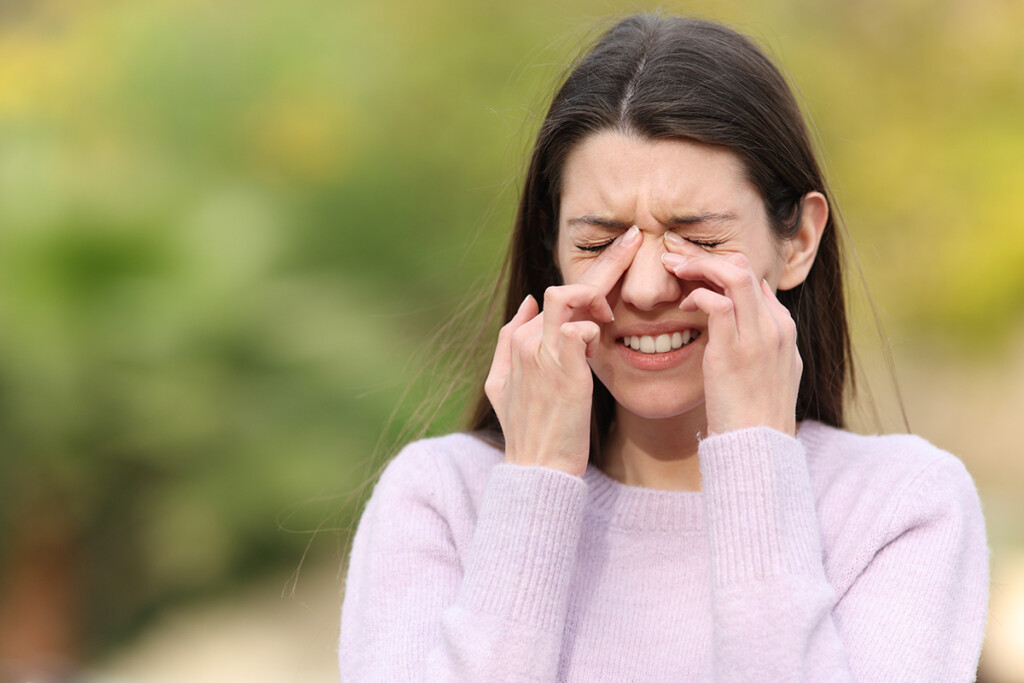4 Ways To Relax Your Eyes This Allergy Season
The pollen count is already creeping up. Stop scratching because getting relief is easier than you thought.

We’re only a few weeks into spring, but some of us are already suffering. A runny nose, a sinus headache, burning and itchy eyes—these are all common signs of seasonal allergies and, though they seem mundane, symptoms can be debilitating. They are also likely to get worse—2024 is predicted to have an increase in pollen production by over 10 percent from previous years, and experts are urging to people to seek preventative treatment sooner rather than later.
Thankfully, there are plenty of both short- and long-term solutions for allergy relief, from nasal irrigation to immunotherapy. And, if your symptoms primarily affect your eyes, Bergenfield-based optometrist James Dello Russo has recommendations for soothing them.
“Eye irritation can be very disruptive and reduce work productivity,” says Dello Russo. “Discomfort and pain can make it difficult to concentrate on tasks. It can impact quality of life and make people avoid preferred activities as well, such as hiking, skiing or enjoying the outdoors.” He adds that eye irritation can cause impaired or reduced vision.
Here are Dello Russo’s tips:
Artificial Tears: Using drops can help deal with eye pain. It’s a quick way to give your eyes some moisture and help deal with the dryness. Doctors advise, however, to consult with a professional to determine the appropriate over-the-counter or prescription eye drops for moisture, recommending brands that are safe and remain FDA approved. Dello Ruso explains, “I usually try to steer patients to preservative-free branded artificial tears, such as Refresh, Systane, Soothe, Blink or Thera Tears. These brands provide lubrication without irritants such as thimerosal as a preservative.”
Hydrating Contacts: As great as it is to ditch the frames, many people have lens intolerance, in which their eyes can be too dry for regular contacts. Fortunately, several brands now make more hydrating, one-day use contacts. Manufacturers will add a lubricating bond onto the lens surface, allowing tears to easily bond to the contacts. Otherwise, your vision can become blurry and the eye even more irritated.
Tear Plugs: For more severe cases, doctors may recommend an in-office procedure to block tear drainage. By inserting punctal plugs into the tear drainage ducts, tears will remain in the eyes, increasing the natural tear film and lubricating the cornea of the eye. “When symptoms are chronic and patients are treating dry eye symptoms more than three or four times a day, every day, then alternative treatment such as punctal plug therapy may be advisable,” Dello Russo says.
Eye Spas: Eye doctors may recommend allergy sufferers undergo LipiFlow, a treatment where patients can have 10- to 20-minute eye massage. LipiFlow provides warm heat and gently massages each eye providing long-lasting relief. “LipiFlow is an in-office, non-invasive therapy. The majority of people with dry eye have evaporative dry eye, meaning their tear film is deficient in lipid-based emollient the eye produces, called meibum,” Dello Russo explains. “When the meibomian glands in the eyelids become clogged or compacted, meibomian glands provide a reduced amount of meibum in the patient tear film. Meibum essentially delays evaporation of tears off the eyes. We use the LipiFlow procedure to treat that.”
How are you dealing with the allergy season? Let us know on Instagram @bergenmagnj.

